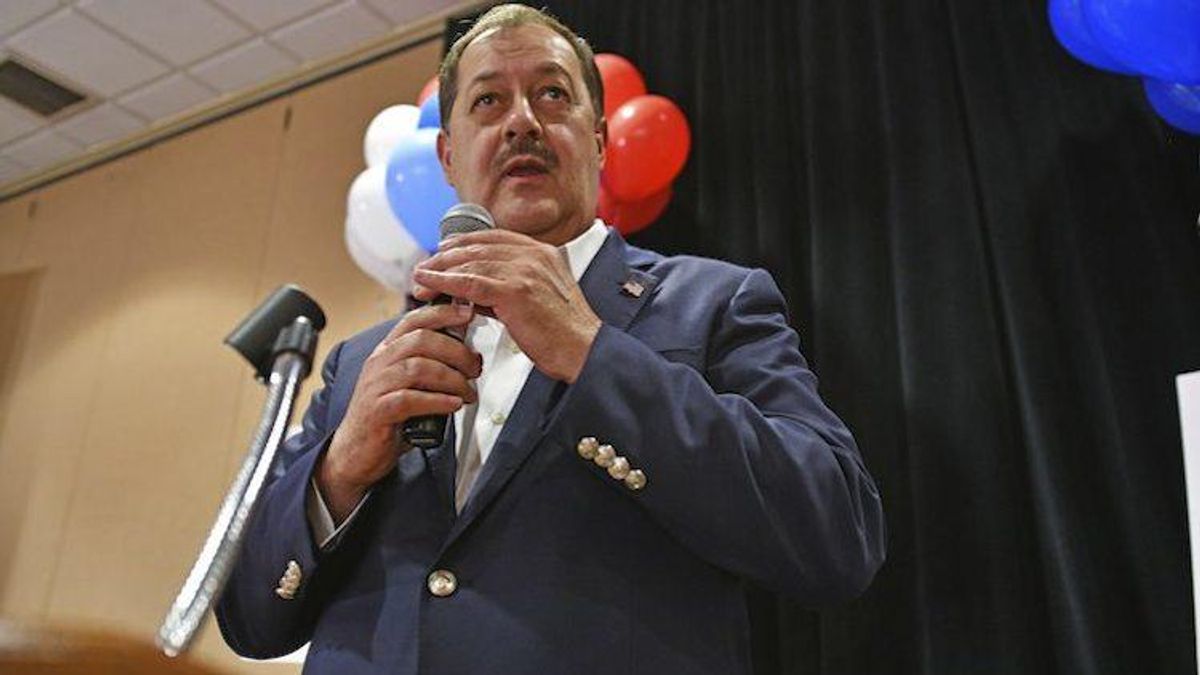Don Blankenship isn't going to be this year's Roy Moore -- an extreme candidate who could win a Republican U.S. Senate primary but would be too toxic to win a general election.
Blankenship, who spent time in prison over safety violations at a mine where 29 workers were killed in a 2010 explosion and who made notoriously racist statements during his campaign, failed to win the Republican Senate nomination from West Virginia today. It was the highest-profile race in primaries being held today in four states -- statewide ones in Indiana, Ohio, and North Carolina as well as West Virginia, and local races in New Jersey.
Blankenship conceded defeat Tuesday evening, CNN reports. He finished third in the primary behind U.S. Rep. Evan Jenkins and West Virginia Attorney General Patrick Morrisey. Several news outlets have declared Morrisey the winner, meaning he will face incumbent Democrat Joe Manchin in November. Manchin had one challenger, Paula Jean Swearingen, but won his primary easily.
Blankenship was CEO of Massey Energy when an explosion killed 29 coal miners at its Upper Big Branch Mine in 2010. He was convicted of conspiring to violate federal safety regulations and served a year behind bars.
During the campaign he famously sparred with a fellow Republican, Senate Majority Leader Mitch McConnell, whose wife, Secretary of Transportation Elaine Chao, was born in Taiwan. Blankenship blasted McConnell's "China family" and said the majority leader has "created millions of jobs for China people." He also called McConnell "Cocaine Mitch" because of an incident in which a shipment of cocaine was found on one of the cargo ships owned by the Chao family's company -- although there is no evidence the company had anything to do with it.
Blankenship has spent much time railing against labor unions, especially the United Mine Workers. He has less of a documented record on LGBT issues, although in 2006 he donated nearly $325,000 to the anti-LGBT West Virginia Family Foundation in an effort to flip seats in the state legislature from Democratic to Republican.
Morrisey, now the Republican nominee, is no supporter of LGBT rights. As attorney general, he joined in a lawsuit against President Barack Obama's guidance to schools on accommodations for transgender students, which included access to restrooms and locker rooms comporting with their gender identity. Morrisey was endorsed by an anti-LGBT group, the Family Policy Council of West Virginia.
Manchin is more conservative than most Democrats, but he has a decent record on LGBT issues. In the last two sessions of Congress, he earned a score of 85 out of a possible 100 on the Human Rights Campaign's Congressional Scorecard,
Although Blankenship had pledged to be "Trumpier" than Donald Trump, the president didn't support him, instead urging voters to support the more mainstream Jenkins or Morrisey. Republicans were trying to avoid a replay of last December's special Senate election in Alabama, where the notoriously anti-LGBT Moore, the former chief justice of the state Supreme Court, won the Republican primary over Luther Strange but lost the general election to Democrat Doug Jones. Moore was undoubtedly hurt by allegations that he had sexually abused girls as young as 14.
In other races: There's likely going to be another Pence in Washington. Mike Pence's brother Greg has won the Republican primary in the vice president's old congressional district in Indiana, and since it's a heavily GOP district, he'll probably win in November's general election.
Greg Pence, a businessman making his first run for office, won the Sixth Congressional District primary with about 65 percent of the vote, CNN reports. Rep. Luke Messer vacated the seat to run for U.S. Senate; Greg Pence is the finance chairman of his Senate campaign. Messer lost his Senate primary today to businessman Mike Braun, who will face incumbent Democrat Joe Donnelly, generally an LGBT ally, in November.
Greg, at 61 the eldest of six Pence siblings, hasn't had much to say about his issue positions during the campaign. He has avoided debates and most interviews, preferring to meet voters one-on-one in the largely rural eastern Indiana district, The Indianapolis Star reports. However, he did tell the paper in an email, "I love my brother Michael and there is no daylight on issues between him and me."
In the general election, he'll face Jeannine Lee Lake, who has been declared winner of the Democratic primary. An African-American businesswoman and community activist, she has pledged to work for living-wage jobs, universal health care, and equal rights for all, including LGBT people.
In Ohio, Rick Neal, a community activist and international aid worker who is gay, won the Democratic nomination for the U.S. House from the 15th District, in the central part of the state. If he wins in November, he will be the Ohio's first out member of Congress. He won his primary easily, with the support of high-profile Democrats such as U.S. Sen. Sherrod Brown as well as the backing of Victory Fund.
In November he will face Republican incumbent Steve Stivers, who has a string of zeroes on the Human Rights Campaign's Congressional Scorecard.
Another Ohio candidate stands to make LGBT with Nickie Antonio winning the nomination for state Senate from the Cleveland-area 23rd District. A Democrat and Victory Fund candidate, she is currently a member of the state House and stands to be the first out state senator, as no Republican is running in the district in November.
Also in Ohio, Richard Cordray, former head of the Consumer Financial Protection Bureau and a strong LGBT ally, won the Democratic nomination for governor over another ally, former U.S. Rep. Dennis Kucinich.
"Betty Sutton [his running mate] and I each have strong records of support for Ohio's LGBTQ community going back 25 years," Cordray told Ohio LGBT publication Prizm News during the campaign. "As governor, I would gladly sign legislation to prohibit discrimination based on sexual orientation and gender identity/expression. Other states have led on these issues and I firmly believe that Ohio must provide an inclusive, welcoming and tolerant environment that is free of harassment and discrimination for everyone."
In contrast, Mike DeWine, the state's attorney general who emerged as the Republican candidate in today's primary, opposes the inclusion of sexual orientation and gender identity in antidiscrimination law, The Columbus Dispatch reports. He has also opposed marriage equality. Ohio's current governor, onetime presidential aspirant John Kasich, is not seeking reelection.
In Ohio's U.S. Senate race, the popular Brown won renomination easily and will face Republican Jim Renacci in the fall. Renacci, a member of the U.S. House, is a Trump-supporting conservative. In the House, he scored a 30 on the HRC's scorecard in the most recent full session of Congress (2015-2016), up from a zero in the two previous sessions. Brown has a string of 100s.
Of the other Victory Fund-endorsed candidates running in today's primaries, six won their primaries out outright and two advanced to runoffs. The outright winners were J.D. Ford, candidate for Indiana State Senate, District 29; Cecil Brockman, candidate for North Carolina House of Representatives, District 60; Deb Butler, candidate for North Carolina House of Representatives, District 18;Allison Dahle, candidate for North Carolina House of Representatives, District 11; and Mark Kleinschmidt, candidate for Orange County, N.C,, Superior Court clerk. Advancing to runoffs were Reed Gusciora, candidate for mayor of Trenton, N.J., and Elvin Montero, candidate for Trenton City Council.
Story developing. Check back for updates.

















































































